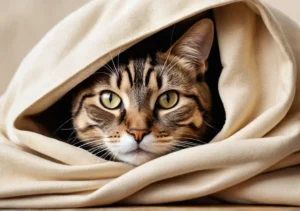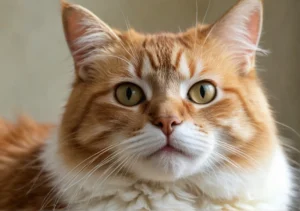Cats are quirky creatures, and their behaviors can sometimes leave us scratching our heads. One behavior that raises concern for many cat owners is teeth grinding.
Teeth grinding in cats, also known as bruxism, can be a sign of a variety of issues, ranging from dental problems to stress. Understanding the underlying causes can help you take appropriate action.
What Causes Cats to Grind Their Teeth
Teeth grinding, or bruxism, in cats can signal a variety of health issues that shouldn’t be ignored. One of the most common culprits is dental pain. Cats are notorious for hiding their discomfort, but if they’re grinding their teeth, they might be trying to cope with tooth decay, gum disease, or even a fractured tooth.
Oral injuries can also lead to this behavior. Cats, being playful creatures, might get into scuffles or accidentally injure themselves while munching on hard toys or bones. If you notice cuts or swelling in their mouths, it’s worth a trip to the vet.
Beyond dental troubles, systemic diseases like kidney issues or hyperthyroidism can cause stress, which manifests as teeth grinding. These conditions can provoke discomfort, leading your furry friend to grind their teeth as a reaction to the pain or anxiety.
Look for other signs like changes in appetite, lethargy, or unusual behavior. Paying attention to these signals can make a significant difference in your cat’s health and comfort.
How Common is Teeth Grinding in Cats
Teeth grinding isn’t something you’ll see every day, but that doesn’t mean it’s rare. It’s more common than many cat owners think, especially in stressful situations or during times of significant change, like moving homes or introducing a new pet.
Grinding typically peaks when a cat is feeling anxious or is in pain. For instance, older cats might grind their teeth more due to underlying dental problems or other health issues. While not all cats will experience this, knowing it can occur, especially if they’re under distress, can help you catch potential problems early.
Be on the lookout in particular situations, such as during:
- Vet visits
- Changes in environment
- Illness
If you observe your cat grinding its teeth, consider these contexts. Observing when it happens can guide you to understanding the cause. It’s important to take this behavior seriously and consult a veterinarian if it persists.
For more detailed information about cat dental care and potential health concerns, check out the American Veterinary Dental College here.
Are There Specific Breeds Prone to Teeth Grinding
Teeth grinding, or bruxism, can occur in any cat, but certain breeds might show a tendency toward it. Siamese, Burmese, and Oriental Shorthairs are known for being more prone to this habit. Their restless natures and predisposition to anxiety can lead to stress-induced grinding.
It’s worth noting that Persians and similar flat-faced breeds sometimes experience dental issues due to their unique jaw structure, potentially leading to grinding as a response to discomfort. If you have one of these breeds, staying alert for signs of bruxism is a good idea, especially since it can indicate either stress or dental problems that need addressing.
What Should You Look for Alongside Teeth Grinding
Teeth grinding can be a signal of more than just a quirky habit. When you notice your cat grinding its teeth, keep an eye out for these additional symptoms that may emerge:
- Excessive drooling: This can suggest oral pain or dental disease.
- Change in eating habits: If your cat seems hesitant to eat or prefers softer food, it might be experiencing discomfort.
- Weight loss: A sudden drop in weight could indicate that your cat isn’t eating well, possibly due to oral pain.
- Behavior changes: Increased irritability, hiding, or excessive grooming might signal stress or pain.
If you see any of these symptoms alongside grinding, it’s time to chat with your vet. Persistent teeth grinding coupled with other red flags often points to underlying issues like anxiety, discomfort, or dental problems that need addressing.
For an excellent resource on dental health in cats, check out The American Veterinary Dental College. They offer a wealth of knowledge on maintaining your cat’s oral hygiene and understanding signs of potential issues.
Lastly, keep your cat’s environment as stress-free as possible—enrichment activities, a cozy space, and consistent routines can make a world of difference in reducing anxiety-related behaviors.
How Can Dental Health Affect Teeth Grinding
Dental problems can lead to some serious discomfort, sometimes causing cats to grind their teeth, also known as bruxism. For instance, malocclusion, where teeth don’t align properly, can create pressure and pain while your cat chews or even rests. This misalignment can drive them to grind their teeth as a coping mechanism.
Moreover, periodontal disease is another culprit. If your cat has gum disease, the inflammation and pain often result in grinding as they try to alleviate discomfort. Signs of dental health issues may include bad breath, difficulty eating, or noticeable changes in behavior like increased hiding or vocalizing.
Regular vet visits are crucial for catching these problems early. Your vet may recommend professional cleanings or even dental procedures if needed. Keeping an eye on your cat’s dental hygiene at home—like offering dental treats or using vet-approved toothpaste—can also help. For more detailed insights, check out the American Veterinary Dental College here.
What Role Does Stress Play in Teeth Grinding
Stress isn’t just a human concern; our furry friends feel it too. Anxiety in cats can manifest in various ways, and teeth grinding is one of them. Factors like changes in the environment—new pets, moving furniture, or even loud noises—can make your cat feel uneasy.
Additionally, some cats may grind their teeth due to boredom or frustration. If your kitty isn’t getting enough mental or physical stimulation, grinding can become a learned behavior. To help reduce stress-induced grinding, try to keep a stable environment, set up engaging playtimes, and consider introducing calming products like pheromone diffusers or stress-relief treats.
Here’s a quick list of things to consider about stress and bruxism:
Identify Triggers : Changes in environment, schedule, or routine can stress your cat out. Keep an eye on what might be causing unease.
Engage Regularly : Schedule interactive play sessions to provide both physical and mental stimulation; this helps distract from stressors.
Safe Spaces : Create cozy, quiet spots where your cat can retreat when feeling overwhelmed.
Pheromone Products : Consider using calming diffusers or sprays that mimic natural feline pheromones to create a soothing environment.
Regular check-ins on your cat’s behavior can help address any stress that might lead to grinding. The goal is to keep your feline pal happy and healthy!
When to Consult a Veterinarian About Teeth Grinding
Teeth grinding in cats , also known as bruxism, can often be an indicator of underlying health issues that deserve attention. If you notice your cat grinding its teeth regularly or persistently, it’s time to consider reaching out to your veterinarian. Here are some key signs to watch for:
- Frequent grinding: If it’s not just an occasional occurrence but happens multiple times a day.
- Accompanying symptoms: If your cat shows signs of pain, like hiding, decreased appetite, or excessive grooming.
- Age-specific concerns: Older cats can have dental issues that might warrant a vet visit.
- Behavioral changes: If your cat’s temperament shifts—like increased irritability or withdrawal—this could indicate discomfort.
It’s crucial to get a professional opinion to rule out dental disease, stress-related issues, or even neurological disorders. Early intervention can make a big difference in your cat’s health and comfort.
How Can You Help a Cat That Grinds Its Teeth
Finding ways to alleviate your cat’s teeth grinding starts with a little observation and a few lifestyle adjustments. Here’s how you can create a comforting environment for your furry friend:
Regular dental care : Make sure your cat’s teeth are checked during vet visits and consider brushing them at home. Dental treats can also help maintain oral hygiene.
Dietary changes : Switch to high-quality, moisture-rich food, which can reduce discomfort during chewing. Look for dental kibble specifically designed to promote oral health.
Stress reduction : Cats can grind their teeth due to stress. Create a calm environment by providing cozy hiding spots, interactive toys, and regular playtime to keep them engaged.
Routine check-ups : Keep up with veterinary visits to catch any potential dental issues early on. Discuss your concerns regarding teeth grinding with your vet.
Pheromone diffusers : Consider using calming pheromone diffusers or sprays to ease anxiety. Products like Feliway can create a soothing atmosphere that may help curb grinding behaviors.
By adopting these strategies and keeping an eye on your cat’s behavior, you can significantly enhance their well-being. If you’re looking for more detailed advice on feline dental health, check out the American Veterinary Medical Association.
Interesting Facts About Cat Behavior
Teeth grinding, or bruxism, is more common in cats than many pet owners realize. While you might think it’s just a quirky habit, it often signals discomfort or stress. Cats can be sensitive creatures, and sometimes their behaviors offer insights into their emotional or physical state.
Did you know cats have a unique way of communicating through their body language? For instance, a twitching tail or flattened ears can indicate anxiety or irritation. Teeth grinding can occur when a cat is feeling particularly stressed or when they encounter an uncomfortable sensation in their mouth.
Interestingly, cats can also grind their teeth when they’re enjoying something sinfully good—like their favorite treat! This behavior is usually harmless in those cases, but when it becomes chronic, it’s worth investigating further.
Keep an eye on your cat’s overall behavior. Changes in eating habits, excessive grooming, or hiding might point to underlying issues that could explain the teeth grinding.
Can Teeth Grinding Lead to Other Health Issues
Chronic teeth grinding in cats isn’t just an annoying habit; it can lead to serious health problems over time. When cats grind their teeth frequently, it can wear down their enamel, making them more susceptible to dental disease. Here are some implications to be aware of:
- Enamel Erosion: Over time, this can lead to increased sensitivity and pain.
- Gum Recession: Chronic grinding may cause gums to recede, exposing roots and causing further dental issues.
- Jaw Disorders: Grinding can put stress on the jaw, potentially leading to problems like temporomandibular joint dysfunction.
- Oral Pain: Persistent discomfort can make eating difficult, leading to weight loss.
It’s essential to keep a close watch on the frequency and intensity of the grinding. If you notice it happening consistently, a trip to the vet is in order. They can check for dental issues or other underlying health problems.
For more information on feline dental health, the American Veterinary Medical Association offers great resources. Check their site here.
Ensure your cat has plenty of chew toys designed for dental health, as they can help relieve stress and improve oral hygiene.
Alex, a passionate animal lover, has experience in training and understanding animal behavior. As a proud pet parent to two dogs and three cats, he founded AnimalReport.net to share insights from animal experts and expand his knowledge of the animal kingdom.




